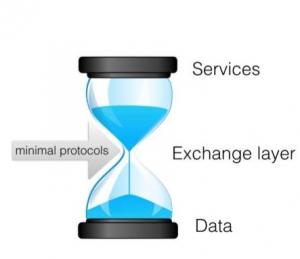
Just a few days ago the High Level Expert Group on the European Open Science Cloud (EOSC) released its first report, A Cloud on the 2020 Horizon, after an extensive round of consultations with key stakeholders.
The report is a wake-up call for the Commission and EU member States invited to close discussions about the “perceived need” for an EOSC while moving swiftly towards realizing the “first phase of a federated, globally accessible environment where researchers, innovators, companies and citizens can publish, find and re-use each other's data and tools for research, innovation and educational purposes”.

Image from “A Cloud on the 2020 Horizon” Report, pg. 12
Very importantly, the High Level Expert Group proposes an hourglass governance model that is lightweight yet effectively relying on minimal rigorous standards. The model would then “prevent costly and time consuming exercises to decide who has the best solutions” allowing instead for “participation from all stakeholders, including research infrastructure providers, Member States, research institutes and businesses”. The EOSC would then be framed as “the EU contribution to an internet of FAIR Data and Services”.
To reach this goal, the High Level Expert Group put forward a roadmap for the successful realization of the EOSC with recommendations focusing along three pillars: Policy, Governance, and Implementation. Actions proposed are far reaching and embrace a number of core issues from the necessity to embark in a concerted effort to develop lacking core data expertise, to revise the funding scheme, from the need to implement new modes of scholarly communication and reward systems, to the need for federating existing gems and bringing the divide between different domains.
Undoubtedly, within this framework, EUDAT – a pan-European data infrastructure featuring a cross-disciplinary suite of research data management services designed in close collaboration with end users from different scientific fields - can make a concrete contribution. EUDAT, together with LIBER, OPENAIRE, GÉANT and EGI released a shared vision statement on their view for the EOSC which details eight elements for the Open Science Cloud's success, namely that it be open, publicly funded & governed, research-centric, comprehensive, diverse & distributed, interoperable, service-oriented and social. EUDAT brought together multiple stakeholders to discuss the EOSC at a workshop in Rome in February 2016 (full report here). The main conclusion of those discussions was that to really implement a successful EOSC framework, we need the preparatory phase project to first look into governance, additional funding and sustainability of the EOSC. Incentives are needed for researchers to share and (re) use their data and this is closely tied to the quality of services which are key for the uptake and success of the platform. The EOSC needs intelligent openness on what can be shared and what not. The EOSC must build upon existing e- and research infrastructures, and it should be a mixed bag of infrastructure, tools and services presented as interoperable virtual environments, “a cloud of services”, for all European researchers to store, manage, process, analyse and re-use research data across geographical, social and technical borders.
At present, the bulk of the suggestions put forward in the Rome workshop, and the elements outlined in the shared vision statement, have indeed been reflected in the High Level Expert Group, while only time will tell if the EOSC will follow some, many or indeed all of these recommendations…
Blog by Hilary Hanahoe & Luisa Nardi, Trust-IT Services Ltd - EUDAT Communications, Outreach & Training
